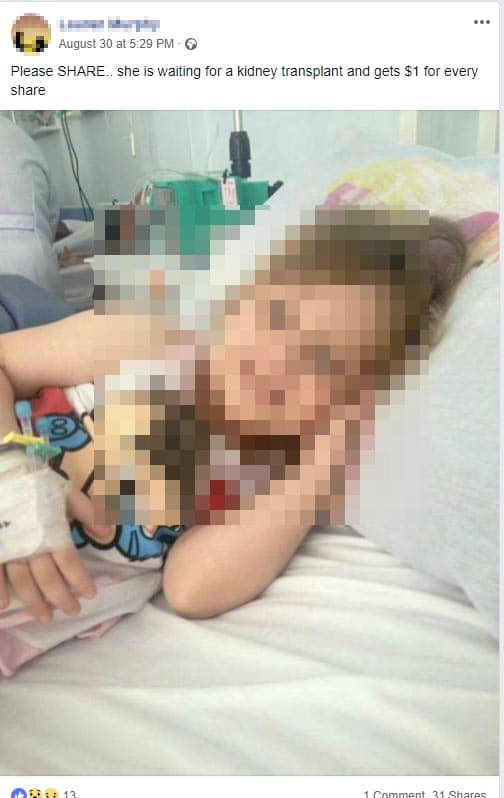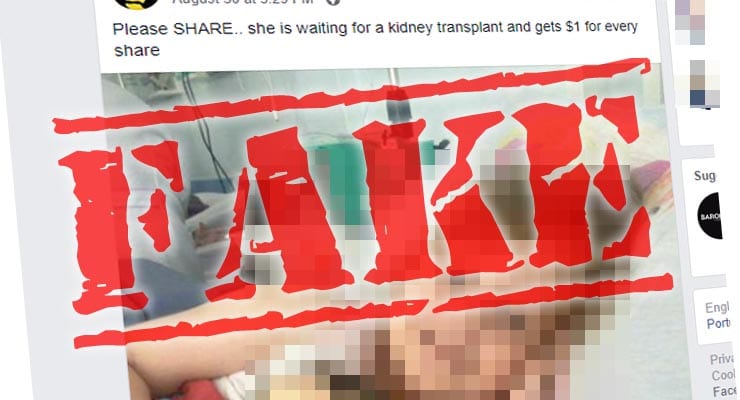$1 donated to girl for kidney transplant when Facebook photo is shared? No, it’s a scam
A photo of a girl in hospital is circulating across Facebook along with the claim that every time the photo is shared, a dollar is donated that will go towards the pictured girl getting a kidney transplant.
 FALSE
FALSE
Examples of the photo as it has appeared across Facebook can be seen below –

She gets a dollar for every pic that’s shared on messenger it goes towards her kidney transplant…. you gotta share plz
Every time her picture is shared she receives $1 toward her donations toward her implant / transplant
Please SHARE.. she is waiting for a kidney transplant and gets $1 for every share
This precious little girl is my cousin’s neighbor in Harrodsburg, Ky. She gets a $1 toward a kidney transplant for every shared photo.
Claims that money is donated to a good cause each time a photo is shared or liked, or that an action of goodwill will only happen if a photo accumulates a certain engagement threshold, is one of the oldest tricks in the like-farmers handbook. Like-farming refers to the common spamming technique prolific across Facebook and other social networking sites where spammers will either exploit, manipulate or deceive Facebook users into engaging (e.g. liking, commenting, sharing) with a Facebook post.
Since the claim that a dollar is donated to a girl each time a photo is shared is entirely false, it is clear that in this case the like-farmers are using deception.
Sponsored Content. Continued below...
No company, including Facebook, donates money to sick children based on something as arbitrary and trivial as how much engagement their photos accumulate on Facebook. The idea in itself is immoral (would a child be denied a potentially life-saving operation because their photo didn’t receive adequate shares?) but equally immoral is that in order to set up these schemes, spammers first need to steal photos of children from the Internet to set up their corrupt ploys.
The girl in the photo is – according to this website – called Aninha, and she lives in Brazil and is battling Leukaemia. The photo was taken on or before 2017, and she isn’t in need of a kidney transplant, and no one is donating money to her when her photo is shared on Facebook.
While many Facebook users often share such photos “just in case” they’re true, we strongly recommend not doing so. Such schemes like this come with a very sinister side. In some cases, photos of children who have since passed away continue to circulate Facebook with similar claims, and have even come to the attention of the parents which invariably causes much distress.
Sponsored Content. Continued below...
In many other cases, parents often battle, fruitlessly, to have photos of their children taken off Facebook but typically fail to do so because of the sheer number of people who unwittingly share these scams. When you have a child in hospital, or has recently come out of hospital, the last thing a parent wants to do is try and remove photos of their children from being shared across the Internet by social media users, regardless of how well meaning their intentions may have been. “Just in case” is really not an acceptable justification for doing this.
Sharing these posts ultimately helps scammers, who are looking to make their content go viral, allowing them to build up popular pages where they can launch scams or sell their pages to marketing companies.
Such schemes are essentially a more modern day spin-off of older yet equally spurious chain email hoaxes that claim you can make money by forwarding an email to your friends.
Despite this type of hoax becoming less popular over the years, this example above clearly demonstrates that there are plenty of Facebook users still falling for such scams. Please don’t share these types of photos and let your friends know as well.
To learn more about this type of like-farming, please see our post here.
Continued below...
Thanks for reading, we hope this article helped, but before you leave us for greener pastures, please help us out.
We're hoping to be totally ad-free by 2025 - after all, no one likes online adverts, and all they do is get in the way and slow everything down. But of course we still have fees and costs to pay, so please, please consider becoming a Facebook supporter! It costs only 0.99p (~$1.30) a month (you can stop at any time) and ensures we can still keep posting Cybersecurity themed content to help keep our communities safe and scam-free. You can subscribe here
Remember, we're active on social media - so follow us on Facebook, Bluesky, Instagram and X
